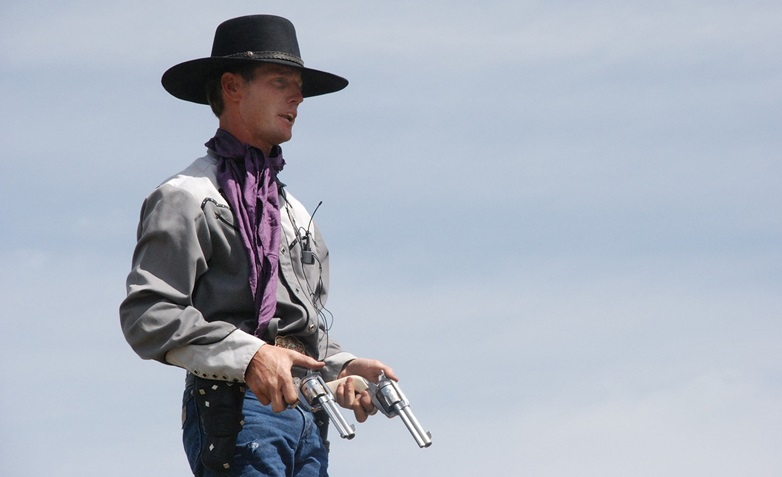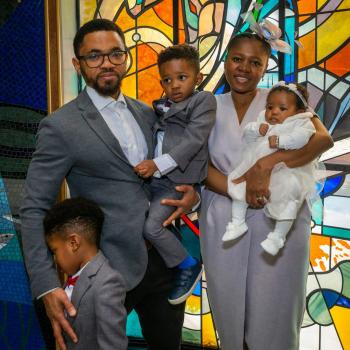“Sheriff, I’m calling you out!” shouts the black-hatted cowboy, striding through the saloon door. Sounds like social media these days.

We’ve all seen the Westerns, our hero marching out to meet the villain at high noon, spurs jangling. Tumbleweeds roll in the background. Harmonica whines as the man in the white hat pulls back his duster, revealing twin pearl-handled iPhones. Fingers twitch inches from his holster. He draws and posts a merciless message. Blowing the smoke away from his screen, he twirls and re-holsters in one quick motion. Why did he fire off that message? Because there warn’t ‘nuff room for the both of us in this town.
“I’m calling you out!”
“I’m calling you out!” We all know what this means—there’s going to be a gunfight in the street, and only one will be left standing. The reason for calling someone out is so that you don’t wreck your favorite saloon, and so nobody gets caught in the crossfire. Somehow, it seems noble to call someone out, rather than starting a brawl or slinging bullets in a crowded bar room. But is this how Jesus’s followers are supposed to behave?
In the past few years, there’s been a lot of calling people out online. Social media has taught us that it’s not okay for people to have different opinions from our own, and if we disagree, we have to call them out. Ensuing arguments can leave “unfriended” corpses scattered like the O.K. Corral, damaging real-life relationships as well as virtual friendships.
This Gunfighter Attitude
This gunfighter attitude has made its way into face-to-face relationships in work, church, family, and social settings. Conformity has become more important than connection, and we’re willing to drop people for disagreeing. We think nothing of calling somebody out in public, creating an awkward situation where we need to prove our opinion right and theirs wrong.
But maybe we need to see this for what it is—not a righteous defense of truth, but a self-righteous assertion of dominance. Of course, we see ourselves as the sheriff in this situation, because it’s the other guy who’s wearing the black hat. (That’s how our minds work–everybody is the good guy in their own story.) Our badge shining, we saunter into the street and piss a circle around our territory. The sun blazes down on our Stetson-shaded eyes, which narrow as we try to figure out who will be the first to draw. That’s what it means to call someone out online. But perhaps there’s a better way. Instead of calling someone out, maybe it’s time to call them in.
Calling Someone In
Calling someone in means inviting them from the O.K. Corral, into the saloon, and ordering two sarsaparillas. It means leaning in close and working to resolve the conflict in private, rather than public. It means sending an instant message rather than arguing with them on their own page in front of their friends. In Matthew 5:25a, Jesus says, “Settle matters quickly with your adversary who is taking you to court. Do it while you are still together on the way.” This was no mere concept. Jesus was all about reconciliation. And if there was a rebuke, Jesus did it in private.
Think about it—Jesus leaned into Judas, close enough for a kiss. After the resurrection, Jesus gathered his disciples in a close huddle and forgave the ones who had abandoned him. “Peace be with you,” he said. He called them in, so close he could breathe on them and say, “Receive the Holy Spirit (John 20:21-22).” Jesus didn’t call them out. He called them in.
Acting Like Jesus
Let’s face it—eventually, our friends, family, coworkers, or neighbors are going to mess up. For Christians, acting like Jesus means that when they do, instead of calling them out, we call them in. We say, “I know this wasn’t your intention, but this was the impact.” We give them the benefit of the doubt for not being the horrible person that they seem like when they said or did that terrible thing. We don’t embarrass them in front of everybody. In fact, by calling them in, we honor them. But neither do we allow the offensive or foolish thing that they’ve done to go without correction. Instead of calling them out in public, we call them in so we can have that close, personal, and difficult conversation.
Correcting People in Public
You may say, “But when Uncle Bernie uses that racist word in front of my mixed-race children, two things need to happen. First, Bernie needs to be corrected. Second, my kids need to see that Bernie is corrected and that they are defended.” You’re not wrong in this. But there is a way to call somebody in—and do it publicly. Don’t let the moment pass by. As soon as those horrible words pass Bernie’s lips, stop everything, and say, in front of everyone, “Bernie, may I have a word with you about what you’ve just said?” Then take him aside and have that private conversation. Your children will see that you’ve defended them, and Bernie will appreciate that you’ve reserved your actual rebuke for private.
Yes, there were times when Jesus called out the religious leaders of his day, with scathing and public words. And, if you’re acting like Jesus, there will be times to call out systems of oppression and discrimination today. But Jesus didn’t jump to the gunfighter mentality. First, he called people in. Look at his conversation with the Pharisee Nicodemus, or his influence on Joseph of Arimathea. It was Jesus’s calling in, not calling out, of Zacchaeus, that led to the tax collector’s conversion. The occasions where Jesus calls people out are examples of the final straw, after multiple attempts of courteous and relationship-based correction.
Gunfighting Etiquette for Christians
So whether you’re in church, at a holiday meal, or on someone’s social media page, if you see something that makes you want to call someone out—try calling them in, instead. Jesus’s followers shouldn’t act like gunslingers. But maybe the old Westerns can teach us some etiquette for Christians. Instead of learning the “Jesus and John Wayne” style of bravado, we can learn how not to handle conflict. By calling someone in, you’ll avoid a gunfight in the streets. Nobody will get caught in the crossfire. You’ll probably make a bigger impact on that person, and you may even get to share a nice sarsaparilla.
For related writing, check out my other articles
- Racist “Try That In A Small Town” Vs. Reconciling “So Long, Dixie”
- When My Relatives Believe Differently
- Good Guys Vs. Bad Buys: Christians And Self-Defense














